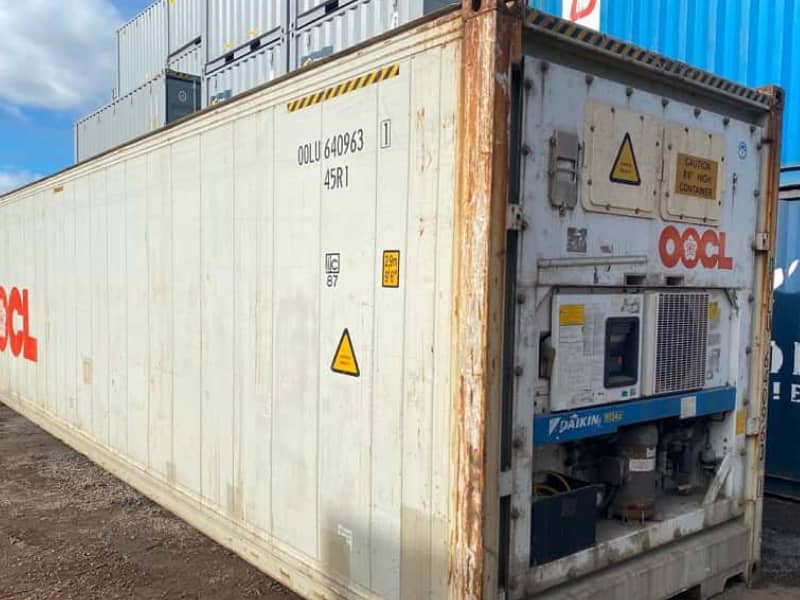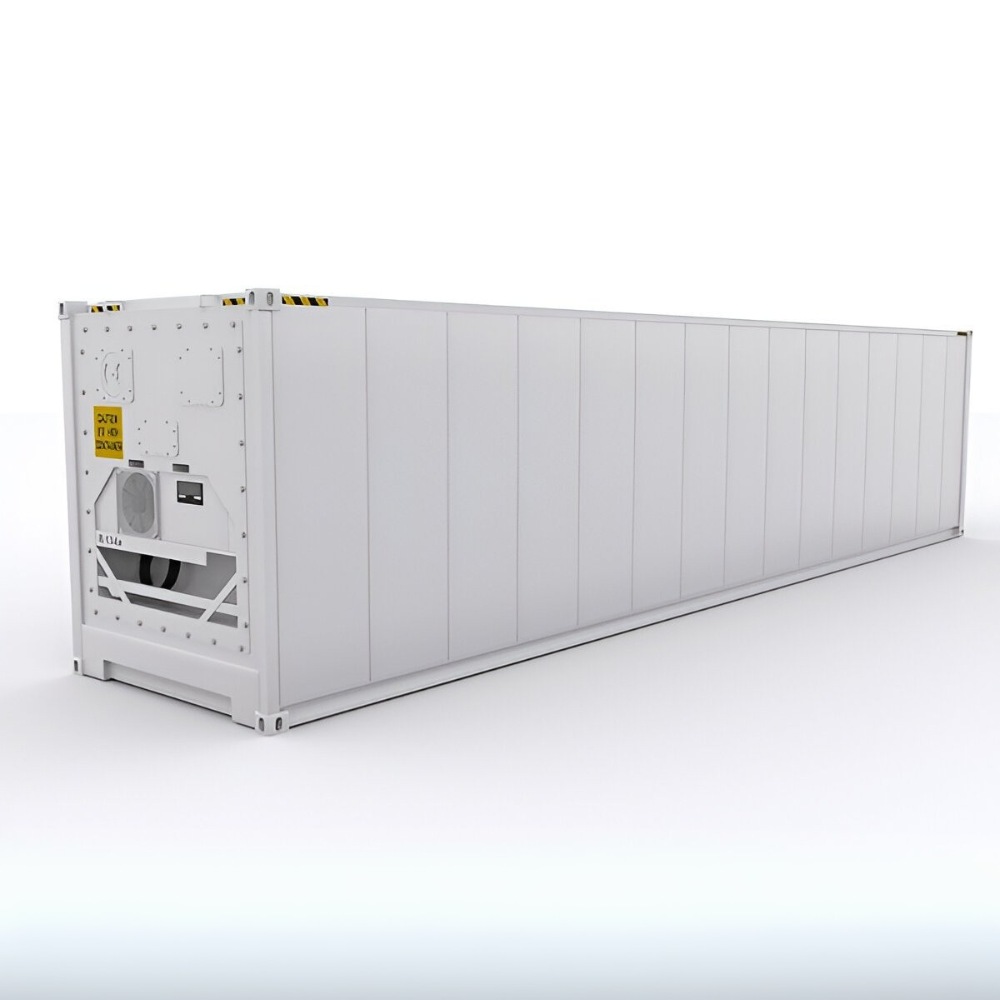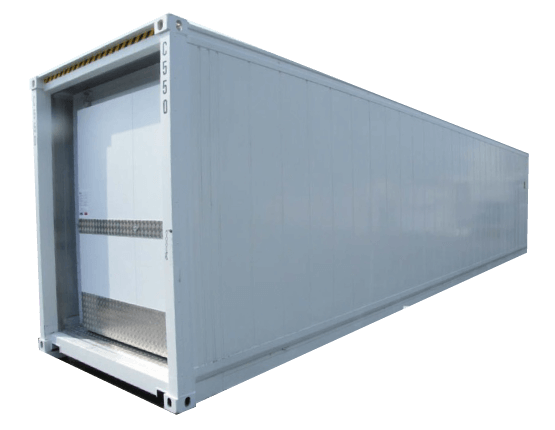Buy used 40ft refrigerated containers for logistics needs with ease
All Concerning Freezer Containers: Important Insights for Your Storage Space Requirements
Cold store containers play a vital duty in the conservation of perishable items. They are available in different forms, consisting of chilled and shielded systems, each designed for details storage needs. Comprehending the benefits and vital functions of these containers is important for businesses intending to optimize their procedures. As the demand for reliable storage solutions expands, checking out the different alternatives available can bring about notified decisions that affect both profitability and sustainability. What aspects should one consider when choosing the appropriate container?
Types of Freezer Containers
Freezer containers come in numerous kinds, each designed to satisfy certain temperature level control demands. Amongst one of the most common kinds are refrigerated containers, which preserve temperatures in between 0 ° C to 10 ° C, making them suitable for perishable products like fruits, vegetables, and dairy products. One more kind is the deep fridge freezer container, which operates at temperatures listed below -18 ° C, ideal for long-term storage of frozen items such as meats and seafood.
Shielded containers give temperature level stability without energetic air conditioning, making them useful for short-term transport of temperature-sensitive items. In addition, there are mobile cold store devices, which supply adaptability in locations and are typically used in events or seasonal operations. Blast refrigerators swiftly lower the temperature level of hot foods, making certain safety and security and top quality. Each kind serves a distinct purpose in numerous sectors, from food solution to drugs, stressing the relevance of picking the appropriate container for certain storage requirements.

Benefits of Using Cold Store Solutions

Furthermore, cold storage space remedies extend the rack life of products, reducing waste and raising productivity for companies. By effectively managing stock with proper temperature level control, companies can maximize their supply chains and enhance functional efficiency.
In addition, cold storage space facilities permit for flexible storage space options, suiting different quantity needs and seasonal changes in need (used 40ft refrigerated shipping containers). This flexibility helps services respond swiftly to market changes
Finally, using cold storage space solutions can ensure conformity with health and wellness and safety and security regulations, securing both customers and companies. Generally, the critical use of cold store improves item monitoring while advertising sustainability and financial stability.
Key Features to Search For in Cold Store Containers
When choosing cold store containers, numerous vital attributes advantage cautious factor to consider to protect peak efficiency and dependability. Initially, temperature level control abilities are necessary; containers need to keep regular temperature levels ideal for certain products. Insulation top quality additionally plays a significant duty, as premium insulation lowers power consumption and boosts temperature level security.
Next off, ease of access and loading is crucial; containers should offer straightforward layouts for effective handling and organization. Resilience is another vital element; weather-resistant materials assure durability and protect contents versus environmental factors.
In addition, wheelchair features, such as integrated wheels or lifting points, promote transport, while customizable formats enable for tailored storage space services.
Lastly, checking systems, consisting of temperature alarm systems and remote monitoring, supply real-time updates, ensuring that problems stay ideal. By concentrating on these features, individuals can pick chilly storage space containers that meet their functional demands successfully.
Selecting the Right Cold Storage Space Container for Your Needs
Selecting the right cold store container needs a thoughtful assessment of operational needs and certain demands. Elements such as the sort of products being stored, temperature sensitivity, and quantity ought to be focused on. Perishable food items may require containers with rigorous temperature level controls, while drugs might require precise conditions to maintain efficacy.
Furthermore, prospective individuals need to consider the container's size and mobility. A larger unit might be essential for mass storage space, while smaller sized, mobile alternatives can be ideal for short-term or on-site needs. Insulation quality and energy efficiency are also crucial, as these will impact operational costs and temperature stability.
Conformity with market guidelines and requirements is necessary, specifically in fields like food and health care. By very carefully examining these elements, individuals can select a freezer container that effectively satisfies their distinct requirements and warranties optimum storage conditions.
Ideal Practices for Keeping Cold Storage Conditions
Preserving excellent cold store problems is crucial for maintaining the top quality and safety and security of investigate this site temperature-sensitive products. Routinely keeping track of temperature and humidity levels is crucial; using trusted electronic thermometers and hygrometers can provide accurate readings. Moreover, appropriate insulation of cold store containers aids lessen temperature level variations and power loss.
Executing a first-in, first-out (FIFO) system guarantees that older inventory is made use of prior to more recent supply, reducing waste (used 40ft refrigerated shipping containers). Furthermore, maintaining an organized design within the storage space enables much better air flow and reduces click reference the risk of cross-contamination
Routine upkeep examine equipment, such as seals and compressors, are essential to stop breakdowns. Team training on ideal methods for loading and unloading products aids keep temperature level stability. Maintaining doors closed as much as possible restrictions heat exchange, ensuring that the cold storage space environment stays steady and effective in maintaining important items.
Price Considerations for Freezer Solutions
When assessing cool storage services, it is vital to take into consideration the first investment expenses along with ongoing operational expenditures. A detailed break down of these prices can expose substantial long-lasting savings potential for organizations. Recognizing these monetary facets helps stakeholders make informed decisions regarding their cold store requirements.

Initial Financial Investment Expenses
The monetary landscape of freezer containers presents different initial investment prices that organizations should think about. These prices commonly consist of the acquisition or rental rate of the containers, which can vary based on kind, size, and insulation top quality. Furthermore, costs connected to retrofitting existing frameworks to accommodate freezer should be factored in, particularly if specialized equipment is required. Installation expenses, consisting of electrical work and refrigeration systems, additionally add to the general first financial investment. Companies must not ignore transportation costs for supplying containers to their desired area. Prospective modification choices, such as shelving or temperature level monitoring systems, can even more impact the preliminary financial expense. Careful budgeting for these elements is necessary for successful freezer execution.
Operational Expenditures Failure
Functional costs for cold store options include numerous critical expense considerations that companies have to navigate. Trick elements include energy expenses, which can be substantial due to the requirement to maintain low temperature levels. Maintenance expenses are additionally considerable, as routine maintenance is important to ensure devices runs efficiently and continues to be check out here compliant with health and security requirements. Additionally, labor costs may arise from the demand for specialized staff to check the storage and handle atmosphere. Insurance coverage costs are another consideration, as business need to secure their investments against potential losses. Ultimately, any type of potential regulative conformity expenses must be factored in, as organizations might need to buy systems that stick to food safety and environmental regulations. Understanding these costs is vital for reliable budgeting.
Long-Term Financial Savings Possible
Buying chilly storage space options supplies considerable lasting financial savings capacity, transforming preliminary expenses into economic effectiveness in time. By lessening wasting and waste, companies can improve their earnings margins significantly. Advanced insulation and energy-efficient systems decrease energy prices, which collect over the life-span of the equipment. Moreover, cold store containers frequently call for less constant upkeep contrasted to typical refrigeration approaches, resulting in lower fixing costs. The ability to shop products for extensive periods without jeopardizing high quality permits companies to take advantage of on market changes, maximizing income. Furthermore, the scalability of freezer remedies allows companies to adapt to altering demands without incurring excessive prices. In general, these aspects add to an engaging case for cold store as an affordable financial investment approach.
Often Asked Concerns
For How Long Can Food Be Saved in Cold Store Containers?
The duration food can be saved in cool storage containers differs by type. Usually, perishable things last from days to weeks, while icy foods can continue to be risk-free for months, relying on appropriate temperature and storage conditions.
Are Freezer Containers Energy-saving?
The power efficiency of cold storage containers varies based upon layout and insulation top quality. Modern devices typically use innovative technology to minimize energy consumption, eventually adding to minimized functional costs and environmental impact in long-term usage.
Can Cold Store Containers Be Personalized for Particular Requirements?
Cold storage space containers can certainly be tailored to fulfill details requirements. Modifications might include temperature level controls, size modifications, and additional attributes, permitting users to customize remedies efficiently for different storage requirements and functional choices.
What Are the Typical Sizes of Cold Store Containers?
Cold store containers typically come in standard dimensions such as 10, 20, and 40 feet. These measurements fit various storage space needs, guaranteeing versatility for businesses needing temperature-controlled settings for delicate materials or perishable items.
Do Freezer Containers Require Special Authorizations for Usage?
Freezer containers often call for special authorizations for usage, depending on neighborhood guidelines and intended applications. Authorities might mandate licenses to assure security standards, ecological compliance, and correct operational methods are kept throughout their use.
Cold storage containers come in numerous kinds, each designed to fulfill specific temperature level control needs. Furthermore, cold storage centers enable for flexible storage space alternatives, fitting numerous volume requirements and seasonal fluctuations in need. Picking the ideal chilly storage space container requires a thoughtful evaluation of operational requirements and certain demands. The financial landscape of chilly storage space containers offers various preliminary financial investment prices that companies need to take into consideration. Cold storage space containers can indeed be personalized to fulfill details needs.